
The Western Hockey League (WHL) is a junior ice hockey league based in Western Canada and the Northwestern United States. The WHL is one of three leagues that constitutes the Canadian Hockey League (CHL) as the highest level of junior hockey in Canada, alongside the Ontario Hockey League and Quebec Maritimes Junior Hockey League. Teams play for the Ed Chynoweth Cup, with the winner moving on to play for the Memorial Cup, Canada's national junior championship. WHL teams have won the Memorial Cup 19 times. The WHL is composed of 22 teams divided into two conferences of two divisions. The Eastern Conference comprises 11 teams from Manitoba, Saskatchewan, and Alberta, while the Western Conference comprises 11 teams from British Columbia, Washington, and Oregon.
Air BC was a Canadian regional airline headquartered in Richmond, British Columbia, Canada. It later became part of Air Canada Jazz. This regional airline primarily flew turboprop aircraft but also operated jets as well as an Air Canada Connector carrier on behalf of Air Canada via a code share feeder agreement.

Time Air was an airline in Canada founded in 1966 by businessman Walter “Stubb” Ross from Lethbridge in Alberta. It was called Lethbridge Air Service before becoming Time Airways Ltd. in 1969, which was later shortened to Time Air Ltd. In 1993 it was merged with Ontario Express to create Canadian Regional Airlines.
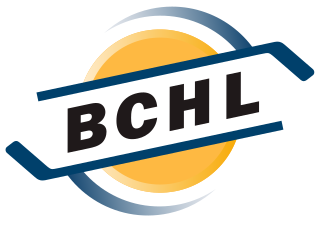
The British Columbia Hockey League (BCHL) is an independent Canadian Junior ice hockey league with 21 teams in British Columbia and Alberta. It was classified as a Junior "A" league within the Hockey Canada framework, until it became independent in 2023. Since becoming independent, the league characterizes itself simply as a Junior ice hockey league.

Fort Victoria, near present-day Smoky Lake, Alberta, was established by the Hudson's Bay Company in 1864 on the North Saskatchewan River as a trading post with the local Cree First Nations. The site had previously been used starting in 1862 as a Methodist Missionary site, on the location of an aboriginal meeting place. It was named Victoria Settlement, after Queen Victoria.
Habitat for Humanity Canada is a non-governmental, and non-profit housing organization in Canada, being the Canadian arm of the global Habitat for Humanity.

Save-On-Foods is a chain of supermarkets located across Western Canada, owned by the Pattison Food Group.
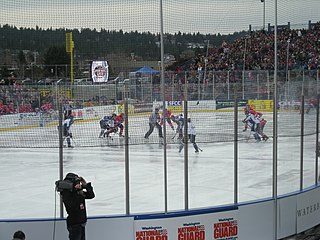
This is a timeline of events throughout the history of the Western Hockey League (WHL), which dates back to its founding in 1966. The league was founded by a group of team owners and managers in Saskatchewan and Alberta, including Bill Hunter, Scotty Munro, Del Wilson, and Jim Piggott, who thought a larger western league would help western teams compete for the Memorial Cup against teams from the larger associations in Ontario and Quebec. Since the league's founding, it has expanded to include 22 teams across the four Western Canadian provinces along with the Northwest United States, and it has produced 19 Memorial Cup championship teams.
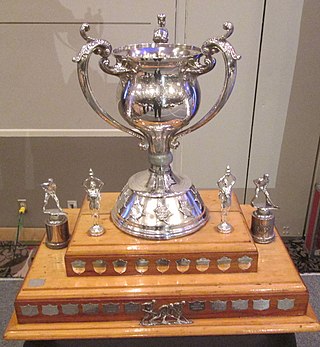
The Abbott Memorial Cup, commonly referred to as the Abbott Cup, was awarded annually from 1919 through 1999 to the Junior "A" ice hockey Champion for Western Canada.
Bob Nicholson is a Canadian ice hockey executive, administrator, and businessman. He has worked for Oilers Entertainment Group (OEG) since 2016, and was previously the president and chief executive officer of Hockey Canada from 1998 to 2014.

George Samuel Dudley was a Canadian ice hockey administrator. He joined the Ontario Hockey Association (OHA) executive in 1928, served as its president from 1934 to 1936, and as its treasurer from 1936 to 1960. He was elected to Canadian Amateur Hockey Association (CAHA) executive in 1936, served as its president from 1940 to 1942, as its secretary from 1945 to 1947, and as its secretary-manager from 1947 to 1960. He was secretary of the International Ice Hockey Association from 1945 to 1947, and was later vice-president of the International Ice Hockey Federation (IIHF) from 1957 to 1960. He was expected to become the next president of the IIHF before his death. He graduated from Osgoode Hall Law School in 1917 then practiced law for 43 years as the town solicitor for Midland, Ontario.

Allan Wilfrid Pickard was a Canadian ice hockey administrator, who served as president of the Canadian Amateur Hockey Association (CAHA) from 1947 to 1950. When Canada opted out of the 1947 Ice Hockey World Championships and decided not to participate in the 1948 Winter Olympics, Pickard felt that Canada was obliged to send a team due to its place as a top hockey nation, and nominated the Ottawa RCAF Flyers who won the gold medal for Canada and lived up to the requirements of the Olympic Oath as amateurs. Despite disagreement with the International Olympic Committee, he sought for the International Ice Hockey Federation to adopt the CAHA definition of amateur in the face of increasing difficulty in selecting the Canada men's national ice hockey team.

William George Hardy was a Canadian professor, writer, and ice hockey administrator. He lectured on the Classics at the University of Alberta from 1922 to 1964, and served as president of the Canadian Authors Association. He was an administrator of Canadian and international ice hockey, and served as president of the Alberta Amateur Hockey Association, the Canadian Amateur Hockey Association (CAHA), the International Ice Hockey Association, and the International Ice Hockey Federation.
This is an index of various lists of people of Canadian municipalities.
The Western Canada Soccer League was a soccer league in Canada. The league operated for eight seasons over a nine-year period from 1963 to 1971 and eventually operated across nine cities in four Canadian provinces and one American state. In the 1960s, the Western Canada Soccer League was one of four major leagues in Canadian soccer alongside the Pacific Coast League, the National Soccer League of Ontario/Quebec, and the Eastern Canada Professional Soccer League.
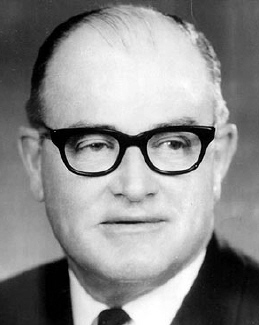
Frank Forest Sargent was a Canadian sports executive in ice hockey and curling. He served as president of the Canadian Amateur Hockey Association (CAHA) from 1942 to 1945, and was president of the Dominion Curling Association (DCA) from 1965 to 1966. He was the first person to be elected to more than two terms as CAHA president, and the first to be president of two national amateur sporting associations in Canada.
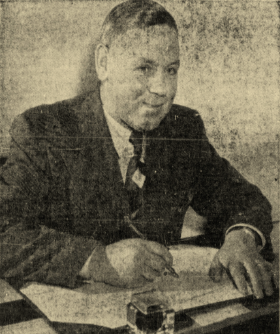
Douglas George Grimston was a Canadian ice hockey administrator who served as president of the Canadian Amateur Hockey Association (CAHA) from 1950 to 1952. He oversaw the establishment of the Major Series for the Alexander Cup and implemented a new deal for player contracts in senior ice hockey, in response to the Allan Cup championship being dominated by a small group of teams who sought to protect themselves from professional leagues recruiting their players. He opposed the National Hockey League wanting its junior ice hockey prospect players on stronger teams, which led to limits on the transfer of players to keep balanced competition for the Memorial Cup. After the 1952 Winter Olympics where the Canada men's national ice hockey team won the gold medal, Grimston recommended withdrawal from Olympic hockey since European nations would never agree to ice hockey rules which allowed physical play. Grimston later accused International Ice Hockey Federation vice-president Bunny Ahearne of financially exploiting of the Edmonton Mercurys on a European tour, which led to a physical altercation between them.
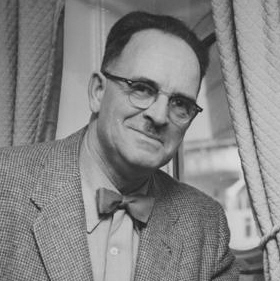
William Bryden George, also known as Baldy George, was a Canadian sports administrator and agriculturalist. He was president of the Canadian Amateur Hockey Association from 1952 to 1955, when Canada debated whether it would withdraw from the Ice Hockey World Championships and the Olympic Games. At issue was the perceived financial exploitation of the Canada men's national ice hockey team and abuse from European media on the Canadian style of physical play. He wanted a financial guarantee for the national team when it travelled since its participation increased attendance at events in Europe. Canada did not participate at the World Championships in 1953 and placed second in 1954, which led to heavy criticism by media in Canada for the failure to win. Although Canada won the 1955 Ice Hockey World Championships, George questioned future participation and was concerned that the game in Europe took on political and religious meanings in which Canada did not want to become involved.
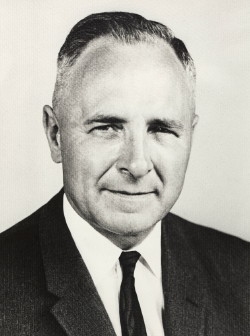
Arthur Thomas Potter was a Canadian ice hockey administrator. He was president of the Canadian Amateur Hockey Association (CAHA) from 1962 to 1964, and oversaw the establishment of a permanent Canada men's national ice hockey team after he decided that sending the reigning Allan Cup champion to international competitions was no longer the answer. He felt that Canada needed discipline to handle Cold War tactics and propaganda at the Ice Hockey World Championships, sought to give its best players to develop as a team, and supported a plan by Father David Bauer to assemble a team of amateur student athletes to complete at the 1964 Winter Olympics.













